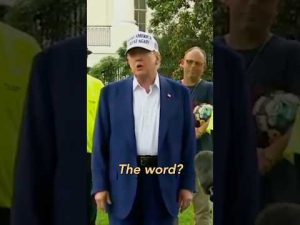It seems the world is once again holding its breath, waiting to see if President Trump will make a decisive strike against Iran. The Middle East has become a pressure cooker of tensions, and Trump’s measured approach is like a chess player on the verge of declaring “checkmate.” Jerusalem, a city with more history than some civilizations can boast, is on lockdown until Friday. One can only imagine the level of seriousness when a place of such spiritual and political significance is sealed tighter than a politician’s tax records.
As the world watches, Trump’s decision on airstrikes against Iran hangs in the balance. Once again, Iran’s leaders have chosen not to heed reason, refusing to sign a nuclear deal despite Trump’s insistence that they had a great opportunity. It’s as if Iran is trying to win a stubbornness contest — not that there’ll be any prizes for that. Meanwhile, American personnel in the region are being instructed to find shelter, while evacuation plans are being considered. Who can blame them when the largest hospital in Israel feels the wrath of an Iranian ballistic missile attack?
The narrative takes an even darker turn with allegations of Iran’s deliberate attacks on civilians, including children. It’s almost like a twisted game of darts, except their preferred target is humanity itself. The situation is sadly reminiscent of history’s darkest days, fueling fears of another conflict sparked by deeply rooted prejudices and hatreds. The stakes are high, not only for the state of Israel but also for Western civilization, which seems to always be on the defense against tyrants with too much power and not enough sense.
What’s particularly ironic is the roles of Russia and China in this geopolitical game of chess. Russia apparently fancies itself as a mediator. It’s almost charming how they pretend to play nice and offer mediation services, all while chaos brews in the background. On the other hand, reports of China’s military transport planes possibly carrying weapons to Iran don’t really scream “peaceful intentions.” Perhaps these two countries are the coaches on the sidelines, except their jerseys read “Team Trouble.”
As these global dynamics unfold, it’s vital to keep an eye on what’s happening with hostages taken by Iran’s proxies. People are participating in rallies, spreading awareness, while the situation remains dire for those held against their will in dingy terror tunnels far from home. International response has so far been a mixed bag of silence and ineffective moral posturing. One can only hope that the world, in unison, finds its collective backbone and demands justice and peace for all.
While President Trump asserts that all options remain on the table, the world waits — some with hope, others with skepticism, but all with bated breath. It’s a balancing act where the stakes are not just political, but profoundly human. The implications of each decision ripple far beyond the rooms where they are made, influencing lives and dictating history. Whatever happens next, it’s clear that this complex and dangerous showdown requires the utmost seriousness and strategic wisdom from world leaders.







